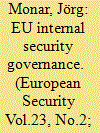| Srl | Item |
| 1 |
ID:
136869


|
|
|
|
|
| Summary/Abstract |
During the first decade after the 9/11 attacks, the European Union (EU) has developed into an international counter-terrorism actor in its own right, a role increasingly accepted by third countries. This is a result of many influences, including a more favourable legal basis after the Amsterdam Treaty reforms; enhanced institutional capabilities, such as the growing importance of the Counter-Terrorism Coordinator; the use of a broad range of instruments, such as intelligence sharing; and the application of geopolitical priorities, guided by meetings at the United Nations and the Council of Europe (among other fora). At the same time, the EU's counter-terrorism role has remained subsidiary, both legally and politically, to that of its member states. Furthermore, a lack of its own operational capabilities, its institutional complexity, and its problems of cross-policy coordination continue to act as powerful constraints on the EU's counter-terrorism responsibilities.
|
|
|
|
|
|
|
|
|
|
|
|
|
|
|
|
| 2 |
ID:
128237


|
|
|
|
|
| Publication |
2014.
|
| Summary/Abstract |
There are clear indicators that in spite of the sensitivity of internal security in terms of essential state functions and national sovereignty an EU governance framework with specific characteristics has emerged in the counter-terrorism field. Common threat assessments guide governance responses, and specific institutional structures, cooperation mechanisms, legal instruments, and forms of external action have been put into place to respond to the cross-border nature of the terrorist challenges. However, in line with the general subsidiary role only of the EU as provider of internal security in addition to the Member States, this governance framework remains based on the interaction and cooperation between national counter-terrorist systems and capabilities that remain largely under national control and still enjoy relatively wide margins of discretion in terms of priorities, legal framework, and organization. This analysis concludes that the EU's internal security governance - as evident from the counter-terrorism field - may be best characterized as an advanced institutionalized system of cooperation and coordination between national governance frameworks constructed around a core of common instruments and procedures with a cross-border reach.
|
|
|
|
|
|
|
|
|
|
|
|
|
|
|
|